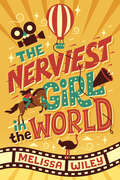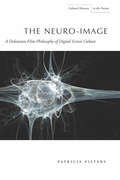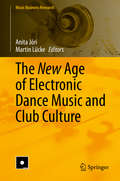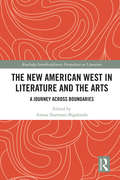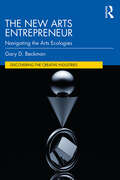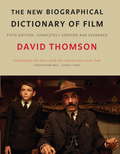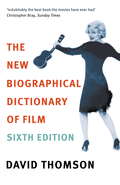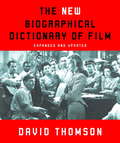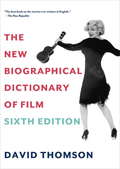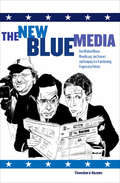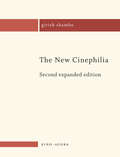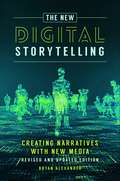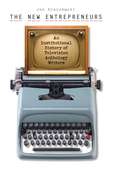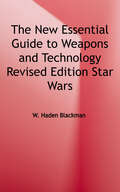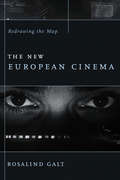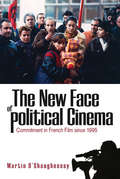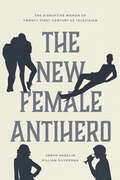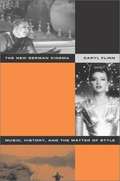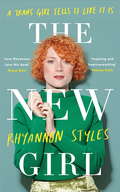- Table View
- List View
The Nation's Stage: The John F. Kennedy Center for the Performing Arts
by Michael Kaiser Michael Dolan David M. Rubenstein"There is a connection, hard to explain logically but easy to feel, between achievement in public life and progress in the arts. The age of Pericles was also the age of Phidias. The age of Lorenzo de Medici was also the age of Leonardo da Vinci. The age of Elizabeth was also the age of Shakespeare, and the new frontier for which I campaign in public life can also be a new frontier for American art." --John F. Kennedy When the John F. Kennedy Center for the Performing Arts opened in our nation's capital on September 8, 1971, its mission was to be the "national center for the performing arts." Forty years later the Center has succeeded in that mission and continues to celebrate it--countless times over--in every state and country around the world, and in the hearts and minds of millions of audience members, performers, and artists. In The Nation's Stage, that history comes alive through a stirring historical and pictorial narrative. An incubator and springboard for some of the most memorable and important theater, dance, opera, and musical productions of the past four decades, the Center has hosted plays by Tennessee Williams, Arthur Miller, Tom Stoppard, and August Wilson, as well as theater for young people with Debbie Allen; dance by Antony Tudor, Agnes de Mille, Mark Morris, and Jerome Robbins; orchestral scores by Leonard Bernstein, Aaron Copland, Dmitri Shostakovich, and John Cage; and breathtaking performances from the world's most notable actors, musicians, and dancers. Every year, millions of Americans and people from around the globe gather at the Center to enjoy the arts. This book, an introduction to the Center's accomplishments and abilities and a commemorative artifact for those who have enjoyed those gifts over the years, is a historical narrative with hundreds of colorful archival photos that allow past audiences to relive the most magical moments at the Center. Those who've never been inside receive a backstage pass to all the glamour and wonder this national treasure has to offer.
The Needle and the Lens: Pop Goes to the Movies from Rock 'n' Roll to Synthwave
by Nate PatrinHow the creative use of pop music in film—think Saturday Night Fever or Apocalypse Now—has shaped and shifted music history since the 1960s Quick: What movie do you think of when you hear &“The Sounds of Silence&”? Better yet, what song comes to mind when you think of The Graduate? The link between film and song endures as more than a memory, Nate Patrin suggests with this wide-ranging and energetic book. It is, in fact, a sort of cultural symbiosis that has mutually influenced movies and pop music, a phenomenon Patrin tracks through the past fifty years, revealing the power of music in movies to move the needle in popular culture. Rock &’n&’ roll, reggae, R&B, jazz, techno, and hip-hop: each had its moment—or many—as music deployed in movies emerged as a form of interpretive commentary, making way for the legitimization of pop and rock music as art forms worthy of serious consideration. These commentaries run the gamut from comedic irony to cheap-thrills excitement to deeply felt drama, all of which Patrin examines in pairings such as American Graffiti and &“Do You Want to Dance?&”; Saturday Night Fever and &“Disco Inferno&”; Apocalypse Now and &“The End&”; Wayne&’s World and &“Bohemian Rhapsody&”; and Jackie Brown and &“Didn't I Blow Your Mind This Time?&”. What gives power to these individual moments, and how have they shaped and shifted music history, recasting source material or even stirring wider interest in previously niche pop genres? As Patrin surveys the scene—musical and cinematic—across the decades, expanding into the deeper origins, wider connections, and echoed histories that come into play, The Needle and the Lens offers a new way of seeing, and hearing, these iconic soundtrack moments.
The Nerviest Girl in the World
by Melissa WileyA feisty girl from a family of ranchers lands a job as a daredevil stunt girl in the early days of silent film in this adventurous and funny cross between Wild Hearts Can't Be Broken and Ramona.Pearl lives on a ranch where her chores include collecting eggs and feeding ornery ostriches. She has three older brothers, who don't coddle her at all. And she knows a thing or two about horses, too.One day, Pearl's brothers get cushy jobs doing stunts for this new form of entertainment called "moving pictures." They're the Daredevil Donnelly Brothers, a Death-Defying Cowboy Trio. Before she knows it, Pearl has stumbled into being a stunt girl herself--and dreams of becoming a star. The only problem is, her mother has no idea what she's up to. And let's just say she wouldn't be too happy to find out that Pearl's been jumping out of burning buildings in her spare time.Filled with action, humor, and heart--not to mention those pesky ostriches--The Nerviest Girl in the World introduces a spunky heroine whose adventures will have kids on the edge of their seats and whose sense of humor will have them laughing until the very last line.
The Neuro-Image: A Deleuzian Film-Philosophy of Digital Screen Culture
by Patricia PistersArguing that today's viewers move through a character's brain instead of looking through his or her eyes or mental landscape, this book approaches twenty-first-century globalized cinema through the concept of the "neuro-image." Pisters explains why this concept has emerged now, and she elaborates its threefold nature through research from three domains—Deleuzian (schizoanalytic) philosophy, digital networked screen culture, and neuroscientific research. These domains return in the book's tripartite structure. Part One, on the brain as "neuroscreen," suggests rich connections between film theory, mental illness, and cognitive neuroscience. Part Two explores neuro-images from a philosophical perspective, paying close attention to their ontological, epistemological, and aesthetic dimensions. Political and ethical aspects of the neuro-image are discussed in Part Three. Topics covered along the way include the omnipresence of surveillance, the blurring of the false and the real and the affective powers of the neo-baroque, and the use of neuro-images in politics, historical memory, and war.
The New Age of Electronic Dance Music and Club Culture (Music Business Research)
by Martin Lücke Anita JóriThis book offers a comprehensive overview of electronic dance music (EDM) and club culture. To do so, it interlinks a broad range of disciplines, revealing their (at times vastly) differing standpoints on the same subject. Scholars from such diverse fields as cultural studies, economics, linguistics, media studies, musicology, philosophy, and sociology share their perspectives. In addition, the book features articles by practitioners who have been active on the EDM scene for many years and discuss issues like gender and diversity problems in general, and the effects of gentrification on club culture in Berlin. Although the book’s main focus is on Berlin, one of the key centers of EDM and club culture, its findings can also be applied to other hotspots. Though primarily intended for researchers and students, the book will benefit all readers interested in obtaining an interdisciplinary overview of research on electronic dance music.
The New American War Film
by Robert BurgoyneA look at how post-9/11 cinema captures the new face of war in the twenty-first century While the war film has carved out a prominent space within the history of cinema, the twenty-first century has seen a significant shift in the characteristics that define it. Serving as a roadmap to the genre&’s contemporary modes of expression, The New American War Film explores how, in the wake of 9/11, both the nature of military conflict and the symbolic frameworks that surround it have been dramatically reshaped. Featuring in-depth analyses of contemporary films like The Hurt Locker, Zero Dark Thirty, Eye in the Sky, American Sniper, and others, The New American War Film details the genre&’s turn away from previously foundational themes of heroic sacrifice and national glory, instead emphasizing the procedural violence of advanced military technologies and the haptic damage inflicted on individual bodies. Unfolding amid an atmosphere of profound anxiety and disillusionment, the new American war film demonstrates a breakdown of the prevailing cultural narratives that had come to characterize conflict in the previous century. With each chapter highlighting a different facet of war&’s cinematic representation, The New American War Film charts society&’s shifting attitudes toward violent conflict and what is broadly considered to be its acceptable repercussions. Drawing attention to changes in gender dynamics and the focus on war&’s lasting psychological effects within these recent films, Robert Burgoyne analyzes how cinema both reflects and reveals the makeup of the national imaginary.
The New American West in Literature and the Arts: A Journey Across Boundaries (Routledge Interdisciplinary Perspectives on Literature)
by Amaia Ibarraran-BigalondoThe story of the American West is that of a journey. It is the story of a movement, of a geographical and human transition, of the delineation of a route that would soon become a rooted myth. The story of the American West has similarly journeyed across boundaries, in a two-way movement, sometimes feeding the idea of that myth, sometimes challenging it. This collection of essays relates to the notion of the traveling essence of the myth of the American West from different geographical and disciplinary standpoints. The volume originates in Europe, in Spain, where the myth traveled, was received, assimilated, and re-presented. It intends to travel back to the West, in a two-way cross-cultural journey, which will hopefully contribute to the delineation of the New—always self-renewing—American West. It includes the work of authors of both sides of the Atlantic ocean who propose a cross-cultural, transdisciplinary dialogue upon the idea, the geography and the representation of the American West.
The New Arts Entrepreneur: Navigating the Arts Ecologies (Discovering the Creative Industries)
by Gary BeckmanThe New Arts Entrepreneur is the first uniquely designed pedagogy for arts entrepreneurship educators and students. Melding an arts-first approach with understandable entrepreneurial concepts and newly formulated tools, the text helps arts students to envision themselves as an entrepreneurial CEO, not simply another random entrepreneur flailing through a maze of well-worn entrepreneurial suggestions that don't fit. At the core of the text are the entrepreneurial ecologies of the arts. The ecologies provide a framework to envision an entrepreneurial horizon for almost any arts-based business, included those ventures seeking to impact the production of art. In addition to this revolutionary framework, the text also introduces tools designed to compliment the ecologies. Designed with arts students in mind, it accomplishes two critical tasks not found in other textbooks: venture sustainability and decision-making. This newly developed approach focuses on the decision-making required to sustain new arts ventures and will be of interest to arts students from all disciplines.
The New Biographical Dictionary Of Film 5Th Ed
by David ThomsonThis book is both more and less than history, a work of imagination in its own right, a piece of movie literature that turns fact into romance.' Gavin Lambert was reviewing the first edition of David Thomson's monumental work in 1975. In the eight years since the third edition was published, careers have waxed and waned, reputations been made and lost, great movies produced, trends set and scorned.This fourth edition has 200 entirely new entries and every original entry has been re-examined. Thus the roster of directors, actors, producers, screenwriters and cameramen is both historical and contemporary, with old masters reappraised in terms of how their work has lasted.Each of the 1,000 profiles is a keenly perceptive, provocative critical essay. Striking the perfect balance between personal bias and factual reliability, David Thomson - novelist, critic, biographer and unabashed film addict - has given us an enormously rich reference book, a brilliant reflection on the art and artists of the cinema.
The New Biographical Dictionary Of Film 6th Edition
by David ThomsonWith more than one hundred new entries, from Amy Adams, Benedict Cumberbatch and Cary Joji Fukunaga to Joaquin Phoenix, Mia Wasikowska and Robin Wright, and completely updated, here from David Thomson - 'The greatest living writer on the movies' (John Banville, New Statesman); 'Our most argumentative and trustworthy historian of the screen' (Michael Ondaatje) - is the latest edition of The New Biographical Dictionary of Film, which topped Sight & Sound's poll of international critics and writers as THE BEST FILM BOOK EVER WRITTEN.
The New Biographical Dictionary of Film
by David Thomson'This book is both more and less than history, a work of imagination in its own right, a piece of movie literature that turns fact into romance. ' Gavin Lambert was reviewing the first edition of David Thomson's monumental work in 1975. In the eight years since the third edition was published, careers have waxed and waned, reputations been made and lost, great movies produced, trends set and scorned. This fourth edition has 200 entirely new entries and every original entry has been re-examined. Thus the roster of directors, actors, producers, screenwriters and camera men is both historical and contemporary, with old masters reappraised in terms of how their work has lasted. Each of the 1,000 profiles is keenly perceptive, provocative critical essay. Striking the perfect balance between personal bias and factual reliability, David Thomson - novelist, critic, biographer and unabashed film addict - has given us an enormously rich reference book, a brilliant reflection on the art and artists of the cinema.
The New Biographical Dictionary of Film: Sixth Edition
by David ThomsonFor almost thirty years, David Thomson's Biographical Dictionary of Film has been not merely "the finest reference book ever written about movies" (Graham Fuller, Interview), not merely the "desert island book" of art critic David Sylvester, not merely "a great, crazy masterpiece" (Geoff Dyer, The Guardian), but also "fiendishly seductive" (Greil Marcus, Rolling Stone).This new edition updates the older entries and adds 30 new ones: Darren Aronofsky, Emmanuelle Beart, Jerry Bruckheimer, Larry Clark, Jennifer Connelly, Chris Cooper, Sofia Coppola, Alfonso Cuaron, Richard Curtis, Sir Richard Eyre, Sir Michael Gambon, Christopher Guest, Alejandro Gonzalez Inarritu, Spike Jonze, Wong Kar-Wai, Laura Linney, Tobey Maguire, Michael Moore, Samantha Morton, Mike Myers, Christopher Nolan, Dennis Price, Adam Sandler, Kevin Smith, Kiefer Sutherland, Charlize Theron, Larry Wachowski and Andy Wachowski, Lew Wasserman, Naomi Watts, and Ray Winstone.In all, the book includes more than 1300 entries, some of them just a pungent paragraph, some of them several thousand words long. In addition to the new "musts," Thomson has added key figures from film history-lively anatomies of Graham Greene, Eddie Cantor, Pauline Kael, Abbott and Costello, Noël Coward, Hoagy Carmichael, Dorothy Gish, Rin Tin Tin, and more. Here is a great, rare book, one that encompasses the chaos of art, entertainment, money, vulgarity, and nonsense that we call the movies. Personal, opinionated, funny, daring, provocative, and passionate, it is the one book that every filmmaker and film buff must own. Time Out named it one of the ten best books of the 1990s. Gavin Lambert recognized it as "a work of imagination in its own right." Now better than ever-a masterwork by the man playwright David Hare called "the most stimulating and thoughtful film critic now writing."
The New Blue Media: How Michael Moore, MoveOn.org, Jon Stewart and Company Are Transforming Progressive Politics
by Theodore HammA look at the journalists and satirists who&’ve helped transform the political landscape in the twenty-first century. The New Blue Media traces the rise during the Bush years of new media stars: the news-saturated satire of The Onion, The Daily Show, and The Colbert Report; the polemical assaults of Michael Moore and Air America; and the instant-messaging politics of MoveOn, Daily Kos, and the netroots. With the exception of Air America, all of these new media outlets have found commercial success—marking, says Hamm, a new era in liberal politics. Does this new media matter? In 2004, both Michael Moore and MoveOn became major players; more recently, the influence of the netroots has sparked upheaval and debate within the Democratic Party. The New Blue Media examines this phenomenon in depth, and the reshaping of both the style and the substance of progressivism.
The New Cinephilia
by Girish ShambuCinephilia has recently experienced a powerful resurgence, one enabled by new media technologies of the digital revolution. One strong continuity between today's "new cinephilia" and the classical cinephilia of the 1950s is the robust sociability which these new technologies have facilitated. Each activity of today's cinephilic practice – viewing, thinking, reading and writing about films – is marked by an unprecedented amount of social interaction facilitated by the Internet. As with their classical counterparts, the thoughts and writings of today's cinephiles are born from a vigorous and broad-ranging cinephilic conversation. Further, by dramatically lowering the economic barriers to publication, the Internet has also made possible new hybrid forms and outlets of cinephilic writing that draw freely from scholarly, journalistic and literary models. This book both describes and theorises how and where cinephilia lives and thrives today. In this expanded second edition, the author revisits some of his original ideas and calls into question the focus in cinephilia on the male canon in the wake of the #MeToo movement and the lack of racial and gender diversity in contemporary cinema. "There is more to the cinephile experience than simply surfing from one link to another in a state of perpetual motion. How does this movement – this daily proliferation of encounters – power one's cinephilia? What special affective charge does this experience hold? In other words, how is the experience of the Internet cinephile affectively different from that of a 'traditional' cinephile who spends little time online?" — Girish Shambu
The New Digital Storytelling: Creating Narratives With New Media
by Bryan AlexanderWritten for everyone interested in the communication potential of digital media, including educators, marketers, communication professionals, and community activists, this is the ultimate guide to harnessing technology for storytelling. No other book covers the digital storytelling movement as thoroughly as this updated second edition of a popular work, nor does any incorporate as many technologies, from video to augmented reality, mobile devices to virtual reality. <p><p> The book combines history, analysis, and practical guidance about digital storytelling. It begins with a history that encompasses an exploration of storytelling itself, as well as a description of narratives using digital tools from the 1980s through 2000. From there, the author dives into modern digital storytelling, offering analysis and guidance regarding the use of digital video, podcasting, social media, gaming, mobile devices, and virtual and augmented reality. The work concludes with practical advice about how to create and share digital stories using the most current tools so even the new would-be storyteller can create their first digital narrative. <p> Of course, the second edition is updated to take into account the many ways the field has advanced since the original book appeared. With many new examples of digital stories, this edition's evidence base is current and fresh. New or transformed technologies are also addressed, including virtual reality; mobile devices that have become mainstream tools for creating, sharing, and experiencing digital stories; and the wide variety of new storytelling apps and services.
The New Entrepreneurs
by Jon KraszewskiAccording to the sociologist C. Wright Mills in his 1951 book, White Collar: The American Middle Classes, the "new entrepreneur" was a lone wolf able to succeed in post-World War II corporate America by elusively meandering through various institutions. During this time, anthology writers such as Rod Serling, Reginald Rose, and Paddy Chayefsky achieved a level of creativity that has rarely been equaled on television since. Yet despite their success, anthology writers still needed to evade the constraints and censorship of 50s television in order to stay true to their creative powers and political visions. Thus they worked as new entrepreneurs who adapted their more controversial scripts for the Hollywood, Broadway, and book publishing industries. Even after the television networks cancelled their prestigious anthology series at the end of the 50s, the most resilient writers were able to redefine what it meant to be entrepreneurs by launching cutting-edge shows such as The Twilight Zone and The Defenders that are still popular today. The New Entrepreneurs includes detailed textual analysis of legendary, sometimes hard-to-find, television anthology scripts that have received only cursory glances in television history until now.
The New Essential Guide to Weapons and Technology Revised Edition Star Wars
by W. Haden BlackmanFrom the Geonosian sonic blaster to the Wookiee bowcaster; from the Imperial energy grenade to the Yuuzhan Vong fire spitter; from dart shooters and laser cannons to Sun Crushers and World Devastators, find the facts about Star Wars firepower--and much more--in The New Essential Guide to Weapons + Technology. There's more to the arms, artillery, and exotic equipment of the Star Wars galaxy than Jedi lightsabers and blasters. Species such as the tree-dwelling Wookiees, the amphibious Gungans, and the deadly Yuuzhan Vong have yielded a staggering array of unique weapons and devices. And as the Star Wars mythos continues to grow--in prequels and video games, on screen, in print, and beyond--these remarkable technical creations also multiply and evolve. The New Essential Guide to Weapons + Technology is the fully updated and greatly expanded reference resource that organizes and explains every key class, make, and model of Star Wars munitions--from the smallest personal sidearms to the most devastating interplanetary superweapons--along with a host of other high-tech paraphernalia. This exhaustive compendium includes:- New in this edition: A fascinating look at the historical significance of Star Wars weaponry and the major technological turning points--including the Clone Wars, the creation of the first Death Star, and the Yuuzhan Vong invasion - A roster of the major manufacturers who created the most powerful armaments for the Old and New Republics, the Empire, the Sith, the Rebel Alliance, andall of the exotic governments that populate the Star Wars galaxy - In-depth descriptions of more than 100 weapons and more than 100 additional devices used for defense, communication, survival, and security--including key technology featured in the films
The New European Cinema: Redrawing the Map (Film and Culture Series)
by Rosalind GaltNew European Cinema offers a compelling response to the changing cultural shapes of Europe, charting political, aesthetic, and historical developments through innovative readings of some of the most popular and influential European films of the 1990s. Made around the time of the revolutions of 1989 but set in post-World War II Europe, these films grapple with the reunification of Germany, the disintegration of the Balkans, and a growing sense of historical loss and disenchantment felt across the continent. They represent a period in which national borders became blurred and the events of the mid-twentieth-century began to be reinterpreted from a multinational European perspective.Featuring in-depth case studies of films from Italy, Germany, eastern Europe, and Scandinavia, Rosalind Galt reassesses the role that nostalgia, melodrama, and spectacle play in staging history. She analyzes Giuseppe Tornatore's Cinema Paradiso, Michael Radford's Il Postino, Gabriele Salvatores's Mediterraneo, Emir Kusturica's Underground, and Lars von Trier's Zentropa, and contrasts them with films of the immediate postwar era, including the neorealist films of Roberto Rossellini and Vittorio De Sica, socialist realist cinema in Yugoslavia, Billy Wilder's A Foreign Affair, and Carol Reed's The Third Man. Going beyond the conventional focus on national cinemas and heritage, Galt's transnational approach provides an account of how post-Berlin Wall European cinema inventively rethought the identities, ideologies, image, and popular memory of the continent. By connecting these films to political and philosophical debates on the future of Europe, as well as to contemporary critical and cultural theories, Galt redraws the map of European cinema.
The New Face Of Political Cinema
by Martin OashaughnessySince 1995 there has been a widespread return of commitment to French cinema taking it to a level unmatched since the heady days following 1968. But this new wave of political film is very different and urgently calls out for an analysis that will account for its development, its formal characteristics and its originality. This is what this book provides. It engages with leading directors such as Cantet, Tavernier, Dumont, Kassovitz, Zonca and Guédiguian, takes in a range of less well known but important figures and strays across the Belgian border to engage with the seminal work of the Dardenne brothers. It shows how the works discussed are helping to reinvent political cinema by finding stylistic and narrative strategies adequate to the contemporary context.
The New Female Antihero: The Disruptive Women of Twenty-First-Century US Television
by Gillian Silverman Sarah HagelinThe New Female Antihero examines the hard-edged spies, ruthless queens, and entitled slackers of twenty-first-century television. The last ten years have seen a shift in television storytelling toward increasingly complex storylines and characters. In this study, Sarah Hagelin and Gillian Silverman zoom in on a key figure in this transformation: the archetype of the female antihero. Far from the sunny, sincere, plucky persona once demanded of female characters, the new female antihero is often selfish and deeply unlikeable. In this entertaining and insightful study, Hagelin and Silverman explore the meanings of this profound change in the role of women characters. In the dramas of the new millennium, they show, the female antihero is ambitious, conniving, even murderous; in comedies, she is self-centered, self-sabotaging, and anti-aspirational. Across genres, these female protagonists eschew the part of good girl or role model. In their rejection of social responsibility, female antiheroes thus represent a more profound threat to the status quo than do their male counterparts. From the devious schemers of Game of Thrones, The Americans, Scandal, and Homeland, to the joyful failures of Girls, Broad City, Insecure, and SMILF, female antiheroes register a deep ambivalence about the promises of liberal feminism. They push back against the myth of the modern-day super-woman—she who “has it all”—and in so doing, they give us new ways of imagining women’s lives in contemporary America.
The New Female Antihero: The Disruptive Women of Twenty-First-Century US Television
by Gillian Silverman Sarah HagelinThe New Female Antihero examines the hard-edged spies, ruthless queens, and entitled slackers of twenty-first-century television. The last ten years have seen a shift in television storytelling toward increasingly complex storylines and characters. In this study, Sarah Hagelin and Gillian Silverman zoom in on a key figure in this transformation: the archetype of the female antihero. Far from the sunny, sincere, plucky persona once demanded of female characters, the new female antihero is often selfish and deeply unlikeable. In this entertaining and insightful study, Hagelin and Silverman explore the meanings of this profound change in the role of women characters. In the dramas of the new millennium, they show, the female antihero is ambitious, conniving, even murderous; in comedies, she is self-centered, self-sabotaging, and anti-aspirational. Across genres, these female protagonists eschew the part of good girl or role model. In their rejection of social responsibility, female antiheroes thus represent a more profound threat to the status quo than do their male counterparts. From the devious schemers of Game of Thrones, The Americans, Scandal, and Homeland, to the joyful failures of Girls, Broad City, Insecure, and SMILF, female antiheroes register a deep ambivalence about the promises of liberal feminism. They push back against the myth of the modern-day super-woman—she who “has it all”—and in so doing, they give us new ways of imagining women’s lives in contemporary America.
The New Female Antihero: The Disruptive Women of Twenty-First-Century US Television
by Gillian Silverman Sarah HagelinThe New Female Antihero examines the hard-edged spies, ruthless queens, and entitled slackers of twenty-first-century television. The last ten years have seen a shift in television storytelling toward increasingly complex storylines and characters. In this study, Sarah Hagelin and Gillian Silverman zoom in on a key figure in this transformation: the archetype of the female antihero. Far from the sunny, sincere, plucky persona once demanded of female characters, the new female antihero is often selfish and deeply unlikeable. In this entertaining and insightful study, Hagelin and Silverman explore the meanings of this profound change in the role of women characters. In the dramas of the new millennium, they show, the female antihero is ambitious, conniving, even murderous; in comedies, she is self-centered, self-sabotaging, and anti-aspirational. Across genres, these female protagonists eschew the part of good girl or role model. In their rejection of social responsibility, female antiheroes thus represent a more profound threat to the status quo than do their male counterparts. From the devious schemers of Game of Thrones, The Americans, Scandal, and Homeland, to the joyful failures of Girls, Broad City, Insecure, and SMILF, female antiheroes register a deep ambivalence about the promises of liberal feminism. They push back against the myth of the modern-day super-woman—she who “has it all”—and in so doing, they give us new ways of imagining women’s lives in contemporary America.
The New German Cinema: Music, History, and the Matter of Style
by Caryl FlinnWhen New German cinema directors like R. W. Fassbinder, Ulrike Ottinger, and Werner Schroeter explored issues of identity--national, political, personal, and sexual--music and film style played crucial roles. Most studies of the celebrated film movement, however, have sidestepped the role of music, a curious oversight given its importance to German culture and nation formation. Caryl Flinn's study reverses this trend, identifying styles of historical remembrance in which music participates. Flinn concentrates on those styles that urge listeners to interact with difference--including that embodied in Germany's difficult history--rather than to "master" or "get past" it. Flinn breaks new ground by considering contemporary reception frameworks of the New German Cinema, a generation after its end. She discusses transnational, cultural, and historical contexts as well as the sexual, ethnic, national, and historical diversity of audiences. Through detailed case studies, she shows how music helps filmgoers engage with a range of historical subjects and experiences. Each chapter ofThe New German Cinemaexamines a particular stylistic strategy, assessing music's role in each. The study also examines queer strategies like kitsch and camp and explores the movement's charged construction of human bodies on which issues of ruination, survival, memory, and pleasure are played out.
The New Girl: A Trans Girl Tells It Like It Is
by Rhyannon Styles'Inspiring and heart-wrenching' Paloma Faith 'Love Rhyannon. Love this book' Grace Dent The remarkable transgender memoir you won't stop hearing about. Rhyannon Styles will do for transgender what Matt Haig did for mental health. Elle columnist Rhyannon Styles tells her unforgettable life story in THE NEW GIRL, reflecting on her past and charting her incredible journey from male to female. A raw, frank and utterly moving celebration of life.Imagine feeling lost in your own body. Imagine spending years living a lie, denying what makes you 'you'. This was Ryan's reality. He had to choose: die as a man or live as a woman.In 2012, Ryan chose Rhyannon. At the age of thirty she began her transition, taking the first steps on the long road to her true self.Rhyannon holds nothing back in THE NEW GIRL, a heartbreakingly honest telling of her life. Through her catastrophic lows and incredible highs, she paints a glorious technicolour picture of what it's like to be transgender. From cabaret drag acts, brushes with celebrity and Parisian clown school, to struggles with addiction and crippling depression, Rhyannon's story is like nothing you've read before.Narrated with searing honesty, humour and poignancy, THE NEW GIRL is a powerful book about being true to ourselves, for anyone who's ever felt a little lost.
The New Girl: A Trans Girl Tells It Like It Is
by Rhyannon Styles'Inspiring and heart-wrenching' Paloma Faith 'Love Rhyannon. Love this book' Grace Dent The remarkable transgender memoir you won't stop hearing about. Rhyannon Styles will do for transgender what Matt Haig did for mental health. Elle columnist Rhyannon Styles tells her unforgettable life story in THE NEW GIRL, reflecting on her past and charting her incredible journey from male to female. A raw, frank and utterly moving celebration of life.Imagine feeling lost in your own body. Imagine spending years living a lie, denying what makes you 'you'. This was Ryan's reality. He had to choose: die as a man or live as a woman.In 2012, Ryan chose Rhyannon. At the age of thirty she began her transition, taking the first steps on the long road to her true self.Rhyannon holds nothing back in THE NEW GIRL, a heartbreakingly honest telling of her life. Through her catastrophic lows and incredible highs, she paints a glorious technicolour picture of what it's like to be transgender. From cabaret drag acts, brushes with celebrity and Parisian clown school, to struggles with addiction and crippling depression, Rhyannon's story is like nothing you've read before.Narrated with searing honesty, humour and poignancy, THE NEW GIRL is a powerful book about being true to ourselves, for anyone who's ever felt a little lost.


